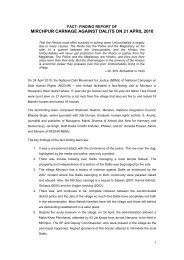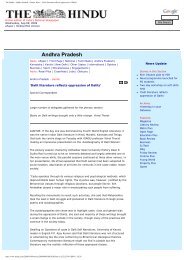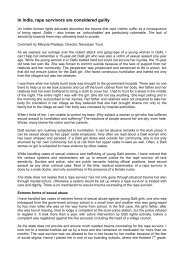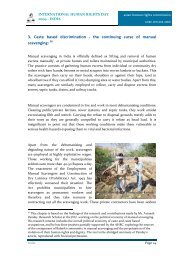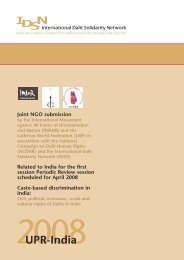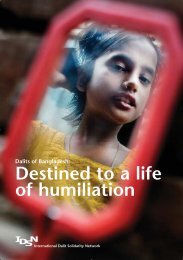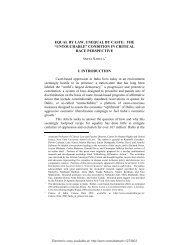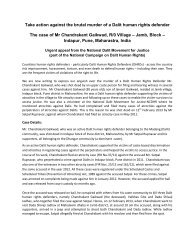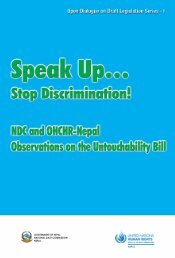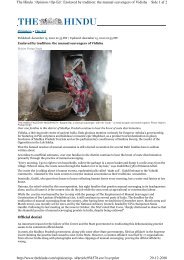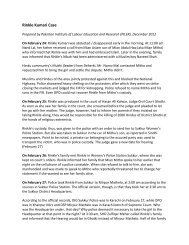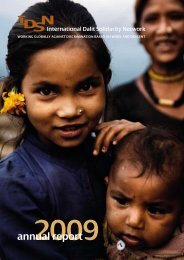A Global Alliance Against Forced Labour - International Labour ...
A Global Alliance Against Forced Labour - International Labour ...
A Global Alliance Against Forced Labour - International Labour ...
You also want an ePaper? Increase the reach of your titles
YUMPU automatically turns print PDFs into web optimized ePapers that Google loves.
A GLOBAL ALLIANCE AGAINST FORCED LABOURforced labour. Meanwhile, action against child traffickinghas been given continued priority by manygovernments, social partners and other actors, oftenassisted by the ILO’s <strong>International</strong> Programme on theElimination of Child <strong>Labour</strong> (IPEC).67. There is still far from full consensus as to thestructural causes of forced labour. In developingcountries there are ongoing debates as to whetherthe failure of credit or financial markets, or agrariansystems and unequal power relationships, explain thepersistence of forced and bonded labour in rural societies.And in all countries, a particularly difficultquestion is whether current patterns of globalizationare actually creating, or contributing to, new formsof forced labour.68. Combating impunity, through a sound legalframework and vigorous law enforcement, is alwaysessential for effective action against forced labour.The following chapter reviews recent regional andnational experience, and discusses some outstandingdilemmas in ensuring that appropriate penalties areapplied for the various manifestations of modernforced labour.69. <strong>Forced</strong> labour can be imposed by the State fordifferent reasons. It can be for political or security reasons,for rehabilitation of prisoners or other detainedpersons, for purposes of economic development, andothers. Chapter 3 examines changes in this regardsince the last <strong>Global</strong> Report on the subject, and drawson an expanded knowledge base to discuss the forcedlabour aspects of prison labour.70. In developing countries, the overwhelming majorityof victims of forced labour are poor. In manycases, the exaction of forced labour can be linked to apattern of discrimination. Poverty and discriminationis therefore a useful perspective from which to reviewpresent-day patterns of forced labour, as well as thepolicy measures and programmes adopted by individualcountries to deal with these problems. Amongother things, Chapter 4 should help demonstrate whya broad mix of law enforcement, social and economicpolicies is needed to come to grips with structuralproblems of forced labour.71. In all countries and regions migrant workers,particularly irregular migrants, are at particular riskof coercive recruitment and employment practices.While the problems are not limited to the industrializedcountries, contemporary forced labour trends inthese wealthier countries – and also remedial action– merit particular attention in this Report. Amongother things, the analysis in Chapter 5 seeks to showwhy human trafficking is very much a forced labourconcern and needs to be addressed more directly assuch in future global action.72. Chapter 6 discusses an issue of considerablecomplexity but of increasing concern, namely thelinkages between forced labour and globalization.The first <strong>Global</strong> Report on forced labour aptly depictedtrafficking as the “underside of globalization”. 2This perspective remains of fundamental importance,as it focuses attention on the dangers that uncontrolledmarket forces entail for the most vulnerablegroups, including migrant women. However, thepresent Report raises yet broader concerns. Beyondcross-border trafficking to the wealthier countrieslie aspects of globalization which increase the risk offorced labour conditions within the poorer countriesthat are under intense pressure to produce cheapergoods for global markets. Given these pressures, whatneeds to be done to avert such dangers?2. ILO: Stopping forced labour, <strong>Global</strong> Report under the Follow-up to the ILO Declaration on Fundamental Principles and Rights at Work,Report I(B), <strong>International</strong> <strong>Labour</strong> Conference, 89th Session, Geneva, 2001, p. 47.18



